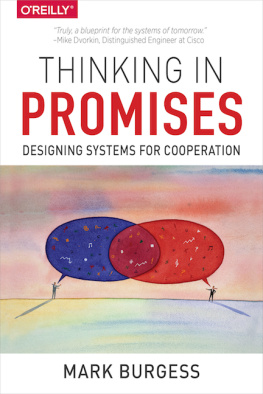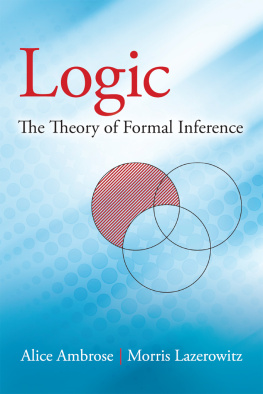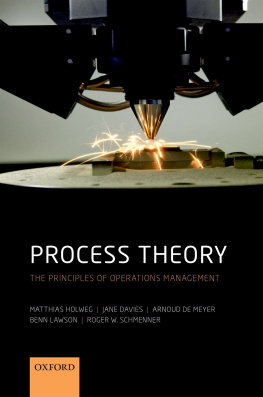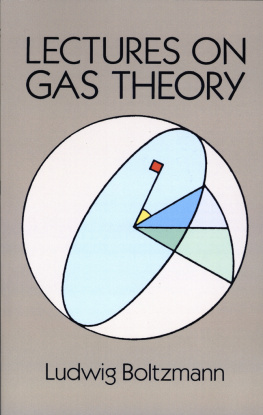Thinking in Promises
by Mark Burgess
Copyright 2015 Mark Burgess. All rights reserved.
Printed in the United States of America.
Published by OReilly Media, Inc. , 1005 Gravenstein Highway North, Sebastopol, CA 95472.
OReilly books may be purchased for educational, business, or sales promotional use. Online editions are also available for most titles (http://safaribooksonline.com). For more information, contact our corporate/institutional sales department: 800-998-9938 or corporate@oreilly.com .
- Editors: Mike Loukides and Brian Anderson
- Production Editor: Melanie Yarbrough
- Copyeditor: Sonia Saruba
- Proofreader: Charles Roumeliotis
- Indexer: Ellen Troutman-Zaig
- Interior Designer: Monica Kamsvaag
- Cover Designer: Ellie Volkhausen
- Illustrator: Rebecca Demarest
Revision History for the First Edition
- 2015-06-09: First Release
See http://oreilly.com/catalog/errata.csp?isbn=9781491917879 for release details.
The OReilly logo is a registered trademark of OReilly Media, Inc. Thinking in Promises, the cover image, and related trade dress are trademarks of OReilly Media, Inc.
While the publisher and the author have used good faith efforts to ensure that the information and instructions contained in this work are accurate, the publisher and the author disclaim all responsibility for errors or omissions, including without limitation responsibility for damages resulting from the use of or reliance on this work. Use of the information and instructions contained in this work is at your own risk. If any code samples or other technology this work contains or describes is subject to open source licenses or the intellectual property rights of others, it is your responsibility to ensure that your use thereof complies with such licenses and/or rights.
978-1-491-91787-9
[LSI]
Foreword
Throughout much of human history, our technological achievement was driven by the quest for certainty and precision. Chaos in all its forms had to be defeated by the clockwork-like precision of the machines we built. We altered the course of flow of rivers. We achieved space flight. We created hierarchical societal structures with protocols and processes. But despite the mathematical precision, we never managed to achieve the robustness and efficiency of natural processes.
Our human intuition tells us that precise understanding of the underlying processes and consistency of their execution are key to well-functioning systems. This belief gives us a seemingly practical mental framework where all conditions affecting such systems are known and understood, or, at least, can be approximated or anticipated in some way. We further quantize the behaviors into sets of well-understood rules and actions and combine them in hierarchically organized global knowledge. A system of consistency hierarchies.
This approach led us to industrialization, but it also gave us an equivalent of industrialized micromanagement. Our control and automation systems turned into the equivalent of sequenced linear execution plans, where each step is a precise actioncertain, predictable, and consistent. Any significant inconsistency leads to local and often cascading failure, at times, with global consequencesall with little or no ability to reconverge.
Our cultural preference for understanding the complete picture led us to the creation of control systems that function as large, centralized, all-knowing brains that make precise decisions based on assumptions of availability and consistency, resulting in actions that are elemental and imperative in natureour intuitive strive to micromanage the reality. Such centralization, even if its logical, leads to inadvertent limitations in scale. A centralized control brain, as large as it can be, still has finite processing capacity. A busy brain cant make decisions fast enough to carry out micromanaging actions in time. Latency of actions creates imprecision and inconsistency, often with unknown consequences.
In this book, Mark Burgess discusses a different philosophical approach to solving large-scale control problems that entirely eliminates the need for a big almighty brain and the very need for micromanagement. Instead, he focuses on breaking the system down into a large number of primitive functions, each fully autonomous, self-enforced, with the ability to deal with imprecision at the lowest level possible. Like in nature, these functions are not centrally orchestratedthey act like organisms that interact with each other in the form of promises, not subjected to absolute universal obligations, not requiring precise consistent knowledge.
Mike Dvorkin
Distinguished Engineer at Cisco
June 2015
Letter to the Reader
Dear reader, this book is an introduction to what has come to be known as Promise Theory. It is addressed from a mostly nontechnical perspective. It is not a book that gives management advice, nor is it even about technical recipes; its goal is to help you to think without prejudice about cooperative systems of any kind.
We live in a marketing age where we believe that brands mean something, so today youll read about Complexity Theory and Promise Theory and Theory of Constraints, and any number of other theories. Many believe that these ideas are all separate, competing sports teams, from which we are allowed to choose only one. Add to that Lean, Agile, Six Sigma, and any number of other management philosophies, and you are practically forced into primitive tribalism.
Promise Theory is not a management ideology; it is an engineering framework for coping with uncertainty in information systems. It is a set of principles, based on formal reasoning, without the over-constrained ideas of logic. Some people (not mathematicians) might call it mathematical because it has formal rule- or constraint-based approaches. Others might say it is heuristic. These are subjective assessments, which are unimportant. In fact, Promise Theory has a lot in common with physics, being a mixture of both, but who cares about categories?
One of the reasons I started Promise Theory was to escape from the tyranny of fuzzy words that float around in management-speak. Words are verbose and often ambiguous, and people hear what they want to hear from them. Symbolic languages, like mathematics, express themselves simply and clearly, but many have been scared away from that precision by a poor experience with mathematics in school. For that reason, I started Promise Theory symbolically, but was quickly asked to go back to using words. That is what this book tries to do. Hopefully, having done a sufficient amount of symbolic homework, I can avoid some of the ambiguities that come from muddling words, but I am still wary. You should be too.
So why this word promise? Well, a promise is a word that everyone intuitively understands. It represents an intended outcome: something you might actually be able to get. This is pretty general, and indeed that is its value. For some, it is also confusing. The term does not have the arrogance or hubris of the more frequently used guarantee, and that is good. A broad swathe of society actually believes that the concept of a guarantee has merit (that merely promising without guarantee is somehow shirking responsibility). In fact, unless one has access to irresistable force and infinite speed, there are no guarantees.
Promise Theory has nothing to do with being nice. It is not about being moral. It is not about democracies rather than dictatorships. It is simply about realism, and attaching the responsibility for outcomes to the agencies that have the chance of being able to deliver. It doesnt tell you how to be immune to uncertainty, it just helps to clear away a veil of delusion, to see more clearly what kind of a mess you are in. The rest (getting yourself out of the mess) is up to good old human creativity (there you can hug as much as you like).What I will claim is that if, like me, you live in daily fear of appearing foolish by making unwarranted assumptions, then Promise Theory is the cold shower of common sense. It turns out to be a pragmatic way of coming to terms with the complexities of a world where you are not certain of having your way.









